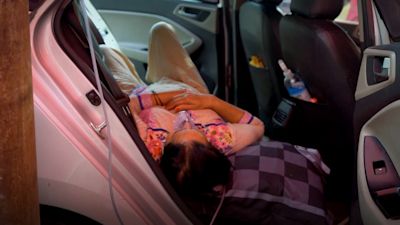India: The fight to provide the poor with free oxygen amid growing black market

ITV News Correspondent John Ray looks at the battle against the black market
"I think, on this earth, you would never have seen this situation where people are dying and we are forced to give oxygen, or a miracle assistance, to people sitting in their cars," Manjinder Singh Sirsa told ITV News.
India's debilitating second Covid-19 wave and a shortage of medical oxygen has produced a black market where cylinders are being sold at up to 15 times their original cost.
The extortionate goods are being snapped up by people forced to care for their loved ones while hospitals overflow with patients.
Mr Singh said he suffers anxiety attacks when he hears from those whose loved ones are dying
In an attempt to prevent coronavirus sufferers being priced out, Mr Singh and other Sikh volunteers in Delhi have been offering free oxygen to people in cars.
The team has also been building a temporary hospital. It is hoped to hold up to 200 beds and will open on Sunday.
"I’ve had anxiety attacks for the last two days, because when I answer my phone... people are crying saying, 'we’ve lost three family members, the fourth is dying in front of me - please help me with a bed'," the president of the Delhi Gurdwara Management committee said.
Such desperation is reflected by India's Covid statistics. The country has set yet another record of new Covid-19 infections in a day - 386,452 cases in the last 24 hours.
The Health Ministry also reported 3,498 more coronavirus deaths on Friday.
In total, the country has a Covid death toll of 208,330, but experts believe the numbers are an undercount.
Mr Singh is one of many blaming the Indian government for the crisis
The country's lead oxygen supplier says the oxygen shortage may not ease until mid May, despite production going up eight-fold this month.
The second wave has seen the virus affecting the lungs more, meaning patients need oxygen for longer than during the first wave.
Experts have blamed the surge of cases on a new variant of the virus.
Many have also pointed their fingers at India's government, who they believe failed to prepare for an inevitable second wave.
Detractors also say Prime Minister Narendra Modi's Bharatiya Janata Party (BJP) allowed unrestricted mass gatherings - such as political rallies and religious events - to continue.
Political parties, including the BJP, have been holding mass election rallies in West Bengal. And on Thursday, millions of voters turned up at polling stations for the state elections with little regard to social distancing.
Coronavirus: What You Need To Know - Listen in for the latest information, advice and analysis on the pandemic
Mr Singh called India's ferocious second wave a "miserable failure of government".
"It’s a total collapse of the system. The word government is not appropriate at this time," he said.
Amid such criticism, the government plans to step up its vaccination rollout by allowing all adults to get their jabs from Saturday. Since January, about 10% of Indians have received one dose, and only 1.5% have received both.
Health Minister Harash Vardhan said he hopes foreign aid will help plug the shortage in medical supplies.
The United States is sending more than $100 million worth of items, including 1,000 oxygen cylinders, 15 million N95 masks and one million rapid diagnostic tests.
Japan said on Friday it will send 300 ventilators and 300 oxygen concentrators.
France, Germany, Ireland and Australia have also promised help, and Russia sent two aircraft carrying oxygen generating equipment. The Indian air force also airlifted oxygen containers from Singapore, Dubai and Bangkok.
The Disasters Emergency Committee (DEC) has extended its coronavirus appeal to include India in order to provide aid and medical supplies to the country. Those wishing to donate can do so here.